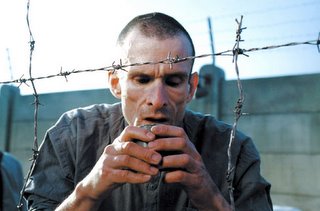A Movie, A book, and A Real Life
 There have been a convergence of events and experiences this past week that have me both thinking and learning a great deal about ethics and leadership:
There have been a convergence of events and experiences this past week that have me both thinking and learning a great deal about ethics and leadership:The Ninth Day is a German movie, a true story about a German priest’s temporary release from Dachau, and the ensuing dilemmas that come to him as he makes ethical decisions which appear costly to those he loves, no matter which choice he makes. The key issue with which I can identify is how every person seems convinced, at some point, that they are standing on the moral high ground: The priest who dissents, the priest who complies with the Reich, and the SS man who seems persuaded that Christ’s words of hope to the Gentiles and disdain for Judaism are the foundation upon which Hitler is building his plan for a master race - all think they're onGod's side, and of course that God is on their side. And there is a priest in the middle of it all, whose choices may determine the fate of other pastors, or his family, or himself. It's a movie about ethics. If we fail to discern properly, all we have are voices all around us, and our basis for choice becomes pragmatic at best or worse, purely self-serving. The multiplication of such shady, unprincipled decisions, are exactly why wars start.
At the same time, I’m preparing to teach on the book of Esther this week which, ironically, has an anti-Semitic plot at its core and is about, like the movie, one’s willingness to live, or die, by the courage of your convictions. I love the story because of it’s earthiness – a beautiful woman who uses all the resources entrusted to her by God to make a difference, but whose use of those resources are a clear illustration of what Jesus said: “Live as wise as serpents and as harmless as doves”. We tend to live like one or the other – either naïve foolishness or continually contriving.
And all this studying and movie watching is taking place against the backdrop of pastoral/relational dramas where I’m reminded that moral courage and ethical wisdom are not just needed in palaces and prison camps. They’re needed right here in Seattle – right now.


3 Comments:
Great post - thanks for sharing.
I think our 'western style'of Christianity, that is the 'me and Jesus only' approach, is reason for a lack of good ethics in the Body of Christ. Not that it can't be found here and there, but it seems that we rather not have a blanket of ethics laid squarely on our soul and mind. Too much of leaving the important daily decisions to whatever works for us at that moment.
So what can we get for rejecting a consistent ethic in our Christian life? Well, Bernie Ebbers comes to mind. The ex-CEO of MCI that lead his company into collapse through egregious fraud while teaching Sunday School at his local church. Or church leaders or members who hold the line at home, but throw it away while on business travel, where rules don't exist.
The Body of Christ labors under this dilema. I agree that it needs dealing with, and it begins with each of us before we can ask it of anyone else.
From your New Advent link "The first to reject the book (Esther) was Luther, who declared that he so hated it that he wished that it did not exist." Interesting. Was that anti-semitism in Luther's day, too? I have always delighted in the heroic story of Esther and how she saved the Jews. Isn't it also interesting that some people think the Bible, and Christianity in general, is so oriented to men, when in fact, there are many women heros of the Bible, Esther being just one of the many. Just a thought.
Post a Comment
<< Home